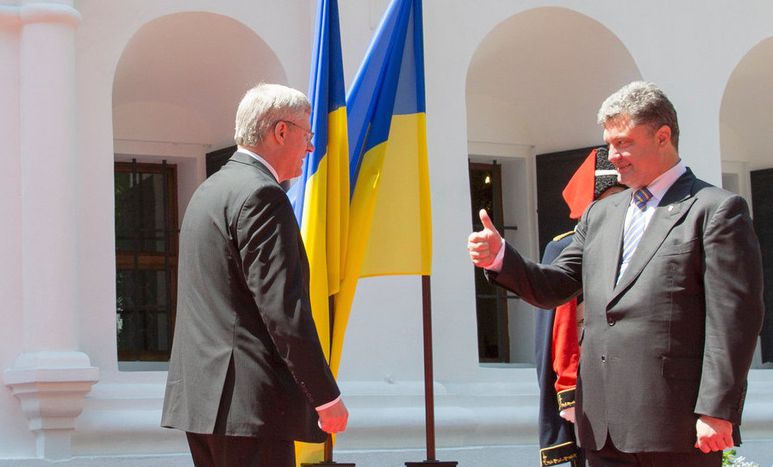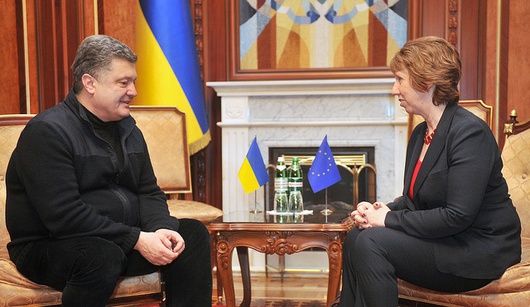
Petro Poroshenko and the Chocolate Factory
Published on
He's a billionaire, an old pal of Putin's, and owner of Roshen, the world's 18th biggest confectionery business. But does Petro Poroshenko, Ukraine's new president, have what it takes to smooth over conflicts with Russia and sweet-talk the EU?
Ukraine is going through a particularly rough patch. 2013 ended with protests and riots about former president Viktor Yanukovich's mismanagement of Ukraine's delicate relationships with both Russia and the European Union. Since then, Yanukovich has been ousted, and things have gotten steadily worse, with economic tensions increasing, the annexing of Crimea and conflict on an increasingly large scale. In a country with an average salary of just £142 a month, financial ties with its neighbouring powerhouses of Russia and the EU are of the utmost importance. Petro Poroshenko, who previously served as the second minister of trade and economic development, was sworn in as president on the seventh of June, amid great hopes for the future of the country. Having sworn to put an end to the fighting and mend ties with both zones, Poroshenko has found himself at an impasse – his ceasefire went up in smoke, and the situation is beginning to look as if it's not as under control as he would have liked.
June 27th will bring Poroshenko's signing of an association agreement with the EU. But just how is this businessman-cum-politician set to keep everybody sweet while making sure he has a finger in all the pies?
Versatility, poroshenko's calling card?
 Democratically elected, Poroshenko surprised the west by gaining clear-cut popularity so soon after riots ousted another rich, well-connected politician from government. With the economic climate presenting problems to your Ukrainian everyman, Poroshenko, with his $1.3 billion empire and veritable mansion just outside of Kiev, may not seem the ideal choice. However, the electorate is not to be predicted, and his landslide victory was seen as a true potential catalyst for change.
Democratically elected, Poroshenko surprised the west by gaining clear-cut popularity so soon after riots ousted another rich, well-connected politician from government. With the economic climate presenting problems to your Ukrainian everyman, Poroshenko, with his $1.3 billion empire and veritable mansion just outside of Kiev, may not seem the ideal choice. However, the electorate is not to be predicted, and his landslide victory was seen as a true potential catalyst for change.
His ties with Russia are complex. Happy to accept the continued use of the Russian language in the east, Poroshenko has always remained clear in his refusal to engage with separatists. However, he made it clear back in 2009, when he was working as foreign minister, that he thought the way forward for Ukraine was as a part of NATO. Strangely, this was something he left out of his presidential manifesto.
Is it versatility that has led to so much of Poroshenko's success? In politics, he has certainly learnt how to juggle: in 2000, he founded the Party of Regions, through which Yanukovich rose to glory. After only a year, he was a leading supporter of Yushchenko (the president of Ukraine from 2005-2010)'s Our Ukraine party. Having also served as foreign minister will surely also have paved the way for managing the cat-and-mouse game Ukraine must play with the rest of the world.
Dancing water shows: a Recipe for success
His success can be attributed in part to his owning a TV station, to which he is regularly invited for interviews. Not dissimilar to the TV debates that have worked so successfully in the UK to affirm politicians' self-branding, this may be part of the secret of Poroshenko's surprising popularity.
Ivan Lozowy, an independent policy analyst, stated before the elections: “There is nothing that he's really done in the short or medium term that even sticks out a little bit.” Paying to artificially boost rankings in polls is allegedly common practice in Ukraine, and Lozowy thinks Poroshenko must have used this strategy, as he was so unheard of before the polls.
Perhaps it is only the residents of Vinnytsia who understand Poroshenko's true appeal. His two confectionery factories in this city have provided over 5000 jobs for locals, all paid at a higher rate than the norm. Add to this Poroshenko's gift to the city: the biggest dancing water show in Europe, considered one of the most impressive in the world and equipped with dancing lasers and inbuilt music. In a speech he delivered there, he claimed that under his presidency, "What we've managed in Vinnytsia, we'll do in the entire country.” An impressive claim, given the high-quality infrastructure and cleanliness for which the city is renowned.
But Poroshenko's previous success – both political and commercial – must surely be weighing on his mind at this point. When 40% of his own income comes from Russia, his position is becoming more precarious, financially. This has, however, garnered him some public sympathy – when the trade war with Russia forced an embargo on Roshen confectionery, Poroshenko's business suffered.
With his sights continually lowering since his election, it is increasingly unclear as to where Ukraine's future lies. One thing is for sure, Ukraine's future is now intrinsically linked to this charismatic enigma of a politician



